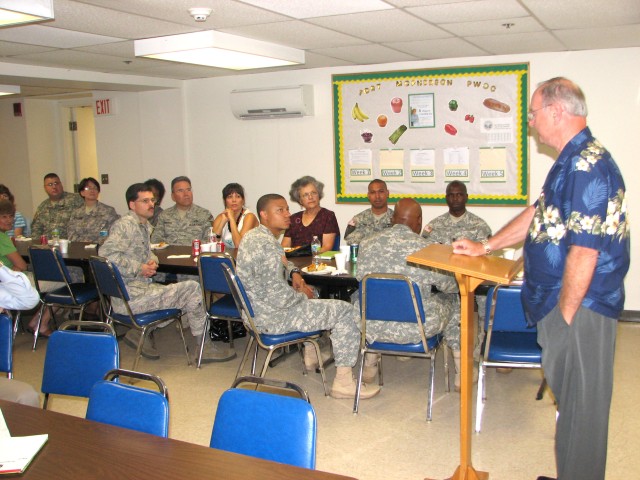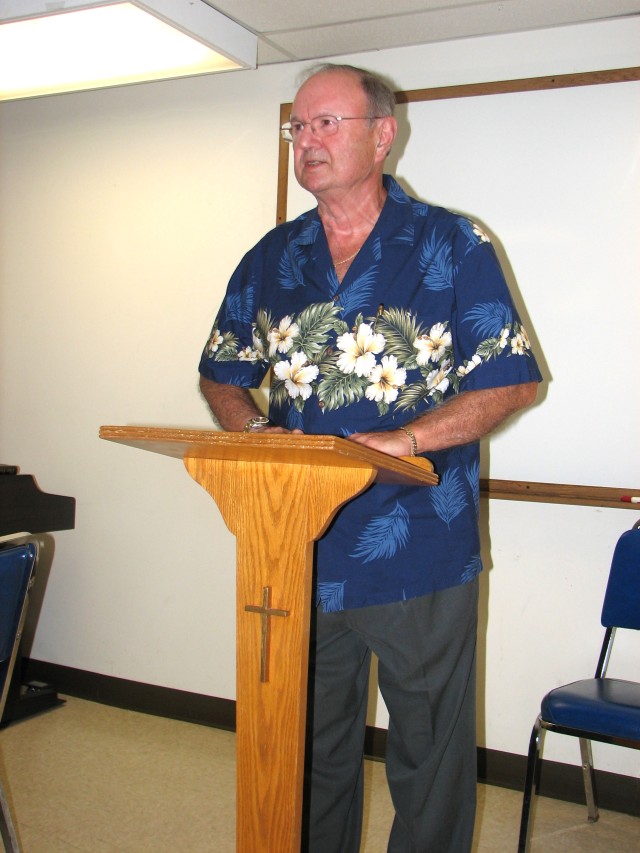It was a chance meeting at Easter Sunday Mass that lead retired colonel Charles Scott to come back to Fort McPherson Tuesday.
What wasn't a chance, however, were the things Scott used to get through the 444 days spent as a hostage in Iran during the Iranian hostage crisis in 1979.
As part of the U.S. Army Garrison Chaplain's Office staff's leadership conference series, Scott spoke to a crowd at the Chapel Center about his captivity and how he was able to stay true to his military vows.
"We are the products of our training and experiences," Scott said. "Faith, strength, God, Family and myself got me through."
The terror began for Scott Nov. 4, 1979, when he, along with 51 other Americans, were captured by a mob of Iranians who stormed the American embassy.
Scott recalled that while watching the crowd crawl over the walls and gates and setting fires, he thought about how, despite not having a weapon, one thing the Army never taught him was how to surrender.
"Just because you're a prisoner, you don't give up fighting," Scott said.
Though it was the first time Scott said he experienced a true loss of freedom and independence, one thing he did not lose was his sense of being a leader.
"You had to be a leader," he said, adding he felt if he broke, others would also break. "Courage is contagious."
To help him through the ordeal, Scott said he came up with three realistic goals: he wouldn't say or do anything to endanger the other hostages, he would remember he was an American warrior and not say or do anything on TV to embarrass the U.S., and he would start practicing how to lie.
"I became an expert liar. I was ashamed but I needed to survive," Scott said. Survive he did, although at times, such as when the Iranians lined the hostages up and performed a mock firing squad execution, Scott said he was afraid.
Determined to "give the Iranians no last spectacle over us," Scott said he stuck to his beliefs, even when he questioned whether he would measure up to other American heroes.
Despite four months of solitary confinement and three-and a-half weeks of interrogation so severe he needed spinal surgery after being released, Scott never broke.
In an ironic manner, it was his torturers who broke first. "I never gave in. They gave up," he said. Although no laughing matter at the time, Scott joked about how the Iranians reacted to his denials to reveal valuable information.
"They told me I must be the dumbest colonel in the Army," he said. "They weren't the first people to tell me that."
Smarts, Scott said, helped he and his fellow prisoners through.
To keep morale up, the group used humor, spreading jokes with the tap code used by Vietnamese prisoners of war.
The code was also used to pass along rumors, with Scott playing the role of the rumor direction center.
Scott said though his self-reliance helped, his belief in God and the power of prayer - both his own and those of others - helped him through.
"I found out when I got home people prayed for us to get through," said Scott, admitting he doesn't like pain.
Despite this, he endured, saying it was because their "prayers were answered." "I won the toughest fight in my entire life," he said.
Today, nearly 30 years after his release, Scott still vividly recounts the ordeal, traveling around to share his story with others.
After Easter Mass, the U.S. Army Garrison Catholic chaplain, Chap. (Capt.) Fred Wendell, talked with Scott and learned about his story.
Wendell said the two were just casually conversing when the subject came up.
Wendell said he knew Scott would be a good speaker for the leadership conference, which brings in leaders from all walks of life to share their inspiration with others on Fort McPherson, something the round of applause Scott received confirmed.
Chap. (Col.) James Agnew, deputy U.S. Army Forces Command chaplain, thanked Scott for his "witness and courage" and provided him with a coin.
Scott also received a gift from the USAG chaplain, Chap. (Lt. Col.) Robert Phillips, the book "The Fourth Star: Four Generals and the Epic Struggle for the Future of the United States Army."
For more information about Scott and the hostage situation, read his book, "Pieces of the Game: The Human Drama of Americans Held Hostage in Iran."




Social Sharing